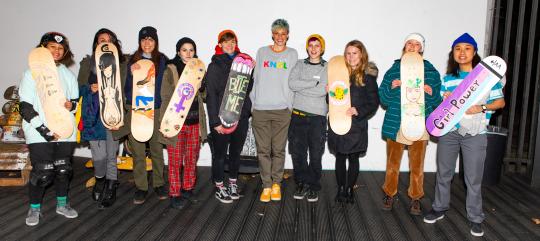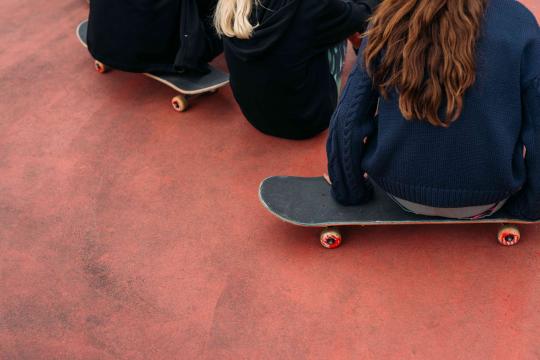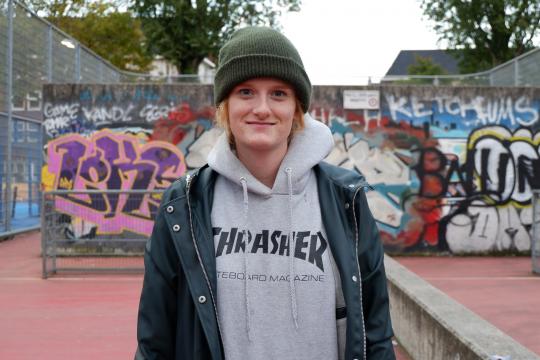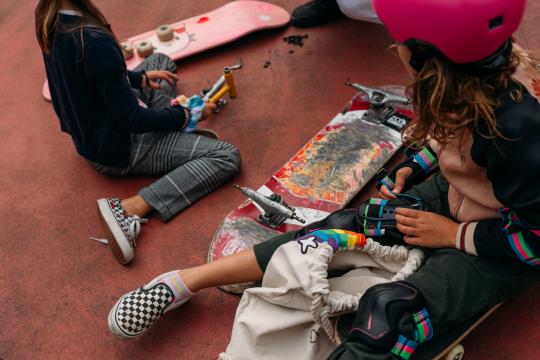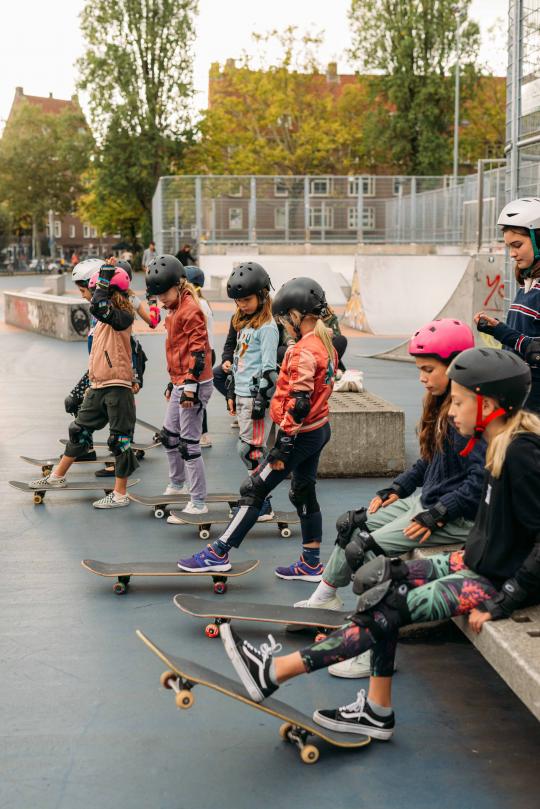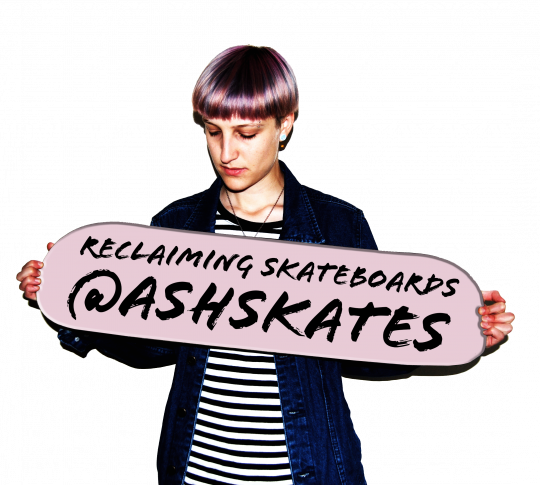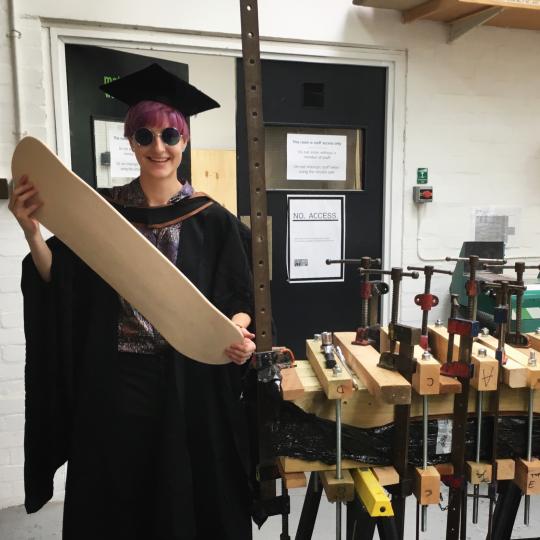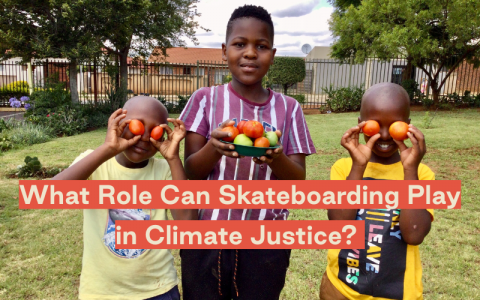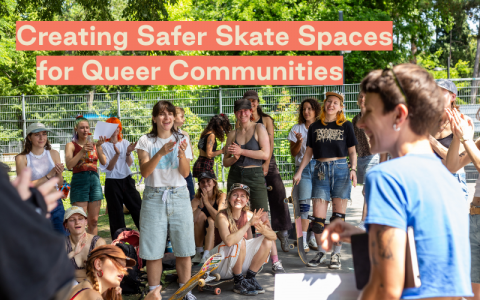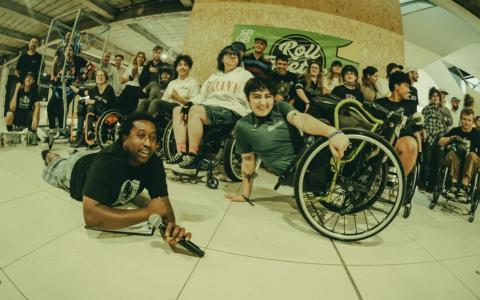Skateboarding is a positive and empowering activity, especially for young girls and women – and it’s a great tool to develop leadership. That’s why last year, Skateistan joined up with Women Win (an NGO that focuses on empowering women through sport) to launch the first round of the ROLL Models program. The aim of ROLL Models is to empower the next generation of women leaders through leadership training and seed grants. A total of 26 womxn were selected to be part of the 2020 ROLL Models program and carry out their own skateboarding projects for girls and women in Greece, Germany, the Netherlands, the UK and Belgium. They also attended an online Leadership Camp.
This will be the last article in our 2020 ROLL Models Blog Series, as we now shift to focusing on this year’s program. To properly wrap up, we are excited to introduce you to Ash Baigent and Nanja Van Rijsse. As with every 2020 Roll Model, both of them have worked hard to make their important contribution to empowering girls and women through skateboarding. Find out more about their thoughts and experiences below!
Nanja Van Rijsse – Women Skate the World
Nanja has a strong background in social skateboarding. She is from Amsterdam, The Netherlands, and she applied for the 2020 call on behalf of her already-established organization – she is the co-founder of Women Skate the World (WSTW). WSTW is an NGO which sees skateboarding as a tool for empowerment, change and an equal society. Nanja is also part of the advisory board of this year’s ROLL Models program so we thought it would be interesting for anyone involved in gender equity and skateboarding to learn more about her steps!
During the ROLL Models 2020 program, Nanja, alongside WSTW, developed a Skate & Create program aimed at getting more girls on skateboards and by doing so, she wanted to create an impact not only in the skateboard community but in the society as a whole. The overall goal of their programs was to inspire, engage and empower young girls. To achieve that, they firmly believe that by combining skateboarding with other activities helps to attract a bigger audience – and ultimately get more girls on skateboards.
“Our project was Skate and Create for children, but on the side we also had a beautiful program which was more for 12+ womxn and LGTBIQ.”
Last year, Women Skate the World had its own skatepark in Amsterdam so they opened it up for girls-only sessions mixing skateboarding, small events, talks and creative workshops. Even if they have an indoor space where they can host these sessions, they also wanted to take it outside in an outdoor morning program in July - August during the summer holiday.
Giving an overview of the context where the program was carried out, this project took place in Amsterdam Southeast’s Amstell III area, which is planned to be rebuilt into a residential area by 2027. In terms of demographics, the area hosts over 150 nationalities varying from expats to immigrants, from Dutch middle-class families to illegal residents of the Netherlands. This borough was built in the sixties as a place for middle class families but in the end became a place where many (labor) immigrants were placed in social housing.
Nanja says that over the years the borough was effectively ignored, mismanaged and underfunded. As a result, the area has been infamous for its crime rates, violence and poverty, however, nowadays most of this is just an image reflecting on the situation in the 90s. Crime rates have decreased and the neighbourhood is getting renewed, making and becoming a hotspot for creativity and innovation – However, in reality this often goes together with housing problems and early residents who have to make way for white and wealthy new people. Besides that, part of this image has been created out of institutionalized racism taking place in the Netherlands. The area has a longstanding experience with racism and underrepresentation in local authorities and governments.
As it is in many areas with a lower socioeconomic status, research shows low sports participation, high obesity rates, increased unsafe home situations, lower school level outcomes, higher unemployment rates and one of the worst mental health problem rates. Nanja’s project target group was girls aged 8-16 who reside in Amsterdam Southeast, most likely from lower or no-income families.
The municipality of Amsterdam helped them out covering the direct costs of skateboards and protective gear. In that way, Nanja managed to reduce that costs and use the Roll Model fund for indirect costs like a stipend, rent, and resources for the programming around the skateboarding – with a main focus of getting more girls on a board.
Due to Covid-19, they had had to postpone the project and make some adjustments to the indoor area to be sure that they could keep the required 1.5m distance in their programs as well providing hygiene materials.
“It was pretty good, I think the most difficult was the influence of COVID-19, of course. So I think the program changed a bit, as well as others. I was really happy that the Leadership program continued even though it was online. I think most of what I got from the ROLL Models program was about networking and being inspired by other people doing the same work.”
Regarding the evaluation of her ROLL Models project, as all participants had to register into the programme, they could track general information like age, postal code, school and media consents. This could be a useful tip for those who are struggling to track their participants' information. For the impact measurement of their activity they have used qualitative data measurement through observation, reports and debriefs. Offering the participants the possibility to provide feedback and suggestions for the programs. As well as quantitative data, they ran a pre- and post-survey in the formal programs.
As mentioned before, Nanja is now part of the advisory board of the 2021 ROLL Models programme and we found it so interesting to ask about her feelings and thoughts about this step. She says that she is excited to see what ideas people are coming with and wants to help them in the best way she can.
“I am really excited to help out in this way, I always wished to have a role in which you can help others and this was just perfect. I am so excited to see what the people are going to come up with, to plan, and to see if I could help by being a mentor or giving advice. Especially for local issues in the Netherlands, maybe I can help with starting the projects and supporting them. It’s good to meet multiple people from different backgrounds, and different project experiences. I’m looking forward to seeing what people are coming up with.”
Ash Baigent – Ash Skates
Ash defines herself as a queer, creative and skateboarding womxn who began running creative workshops for womxn whilst in the final year of her Design degree. She has always been obsessed with skateboards and she finally taught herself how to make decks. Also, she has felt fed up with the misogynistic, sexist and offensive graphics on skateboards so she started to design and make boards. Along the way, she also started holding workshops to enable and inspire other womxn to create their own board designs and reclaim equity on skateboards. Although she feels that there is a long way to go still when it comes to gender equity in skateboarding, she believes the situation is getting better thanks to the community that has been created.
Ash says that “empowering and showing that we exist is the first step to being seen as equal”. She wanted to encourage and support fellow womxn in the industry but she struggled to find any womxn making their own skateboards. In response, she set out to reclaim skateboards for womxn by producing the decks herself. Her workshops are intended to get womxn involved with creating their own graphics on skateboards; putting their own messages into the world. This is a form of personal protest and an effort to outnumber the bad graphics that exist.
Ash’s projects were kind of different from the rest of the 2020 ROLL Models. Despite some of them using art and creative activities in their programmes, Ash highlighted the creative aspect as the main topic.
“It was really cool to be part of the [ROLL Models] project. My project was to make five women build up a skateboard. It was about teaching womxn how to build a skateboard and also how to ride it as well.”
She was planning to do an in-person workshop in the factory that she usually works in but finally, due to Covid-19 restrictions, she had to adapt the methodology into the new circumstances. She first organized three online workshops to initiate the project with five womxn and each one created their own skateboard. She tracked the progress of the designs and took photos at the end with each of their designs on their boards. The final step of her ROLL Models project was to create a short documentary about her passion for making skateboard decks and to show the whole process in order to empower other womxn skaters who want to learn. She filmed it in Big-Aye’s workshop, showing each step of the building process of a skate deck and finally she made an amazing must-see video-tutorial.
“At first, before COVID, I was planning to get the people into the workshop and teach them how to make a board. But then with the social distancing and the workshop not being open I had to do a video of how to make a skateboard so people can just watch it, it was like a tutorial.”
We are so happy to hear she plans to continue doing this work, and even plans to create her own workshop space in the future!
“My plan is to get an open workshop, maybe with a few people at each time. Teach them how to make a board, do the graphics as well and actually teach skateboarding at the same time.”
Stay tuned for updates on our 2021 ROLL Models program, which is kicking off this month with the first Leadership Camp Webinar!
